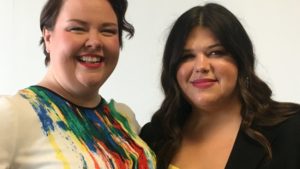
| Feature
NBC: One Year After Cancelled Performance, Jamie Barton and Leah Crocetto ‘Welcome Back’ Audiences to The Dallas Opera
For Jamie Barton and Leah Crocetto, the harsh realities of the coronavirus pandemic began in Dallas. Barton and Crocetto were in rehearsals for Verdi’s Don Carlo at The Dallas Opera in March 2020 when the pandemic forced stages around the world to go dark.
One year later, the opera stars return to The Dallas Opera, singing “American Songbook” on April 3 as a part of the opera company’s “Welcome Back” Song Series at the Winspear Opera House.
March 13, only days before Don Carlo was scheduled to begin, is when the world changed for Barton and Crocetto. “Leah and I were together when we got the news that Don Carlo was canceled. We were standing in the Whole Foods,” Barton said. “We went to a restaurant and sat on the porch.”
“We got a little bit tipsy,’ Crocetto said.
“A little bit?” Barton replied with a laugh.
Barton, the mezzo-soprano who won the Beverly Sills Award and the BBC Cardiff Singer of the World Competition, remembers driving home to Georgia on March 14, unsure of the future. “At the time, we were just wondering what was going to go forward, what wasn’t going to happen. Quite honestly, at the time, I had a contract coming up at The Met and I found out on Twitter that I wasn’t showing up apparently for the beginning of rehearsals. And then I found out again on Twitter that I had lost the contract entirely,” Barton said.
Crocetto, known for successfully taking on a variety of dramatic soprano roles, was crushed by the sudden loss of artistic opportunities. “I had a lot of role debuts, house debuts for this past year and all of them, just one after another cancelled, cancelled, cancelled. I was supposed to do my first Norma, my debut in Dallas, my debut in Australia. It’s been so many I can’t remember all of them,” Crocetto said. “Total devastation.”
She was living in Washington, D.C. at the beginning of the pandemic, enduring anxiety as the virus spread. “The first couple of months, I was completely depressed and just unsure, didn’t have a clue as to what was going to happen and I was scared,” Crocetto said.
Suffering financially and wishing to be closer to family, she decided to move to Ann Arbor, Michigan in May. “They say moving is as traumatic as losing someone in your life and I can concur,” Crocetto said.
Crocetto accepted a teaching position at her alma mater, Siena Heights University. “I wasn’t going to take the job because I didn’t have time, but then all of a sudden I did have time, so I said ‘yes’ and it has been my saving grace. The kids are amazing, and I have formed life-long relationships with a lot of them. They are just so special and hungry, and they have loved learning,” Crocetto said. “Teaching has saved my life.”
Barton became a caregiver to family members suffering medical issues, took on virtual events, and hoped for live performances to go forward as planned.
“The continuing of hearing that this place is going to go ahead, they have plans to go ahead, they are going to do it and then losing the contract and of course, that needed to happen. We couldn’t safely do performances,’ Barton said. “That kind of hanging on and waiting to hear when things are going to fall through, that took a lot of processing, and honestly, that’s still happening and I’m still processing. It doesn’t get easier.”
Other than singing Verdi with the Dallas Symphony Orchestra in the fall for a socially distanced audience of about 200, Barton has deliberately stepped away from singing classical music every day.
“I started to focus on singing as fun, singing just because I love it, singing whatever I want. I’m so glad that I did because in the process of stepping back from the job of singing, my creative brain has really been going and I feel like I’ve expanded my knowledge of my voice and just experimenting with new styles and having fun with it,” Barton said.
“American Songbook” is a feast of music celebrating American favorites, the music Barton and Crocetto love singing. “It’s in our blood. It’s music I’ve been singing since I was a little girl,” Crocetto said. “I feel like the audience as a whole is going to drink it in because it is music that speaks to the heart. It’s music they understand.”
Barton and Crocetto will sing the music of Cole Porter, Harold Arlen, George Gershwin, and Jason Robert Brown. “I’m personally hoping that we have people lose themselves in the moment, maybe humming along with us, just having a connective experience in a theater for the first time in a very long time,” Barton said.
With vaccinations rolling out around the world, the singers are anticipating the future of opera. “I think it’s going to go back to the love of the music as opposed to creating Hollywood onstage and I think that’s going to be exciting to watch,” Crocetto said.
Barton and Crocetto hope to see the opera industry take on stories reflective of the current moment as it addresses issues of diversity.
“I’m already seeing this industry walking in the direction of really investing in creators of color, in investing in having diversity in the company all the way through the ranks,” Barton said. “That’s going to be a conversation that doesn’t stop.”
“Yes, the arts are escapism, but the arts were intended to start a conversation and sometimes are intended to make people feel uncomfortable, so they do something. It’s supposed to entertain but also to rile up,” Crocetto said.
“I have a lot of hopes for what can be,” Barton said.